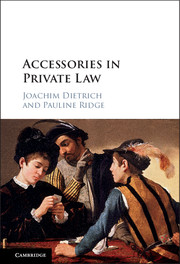Book contents
- Frontmatter
- Dedication
- Contents
- Foreword
- Preface
- Table of cases
- PART I General principles
- PART II Accessory liability in private law
- 5 Torts
- 6 Breach of contract
- 7 Infringement of equitable property rights
- 8 Breach of equitable duties
- 9 Infringement of statutory intellectual property rights
- 10 Other statutory wrongs
- 11 Wrongs involving companies
- PART III
- Index
5 - Torts
from PART II - Accessory liability in private law
Published online by Cambridge University Press: 05 February 2016
- Frontmatter
- Dedication
- Contents
- Foreword
- Preface
- Table of cases
- PART I General principles
- PART II Accessory liability in private law
- 5 Torts
- 6 Breach of contract
- 7 Infringement of equitable property rights
- 8 Breach of equitable duties
- 9 Infringement of statutory intellectual property rights
- 10 Other statutory wrongs
- 11 Wrongs involving companies
- PART III
- Index
Summary
Introduction
Overview of chapter
The liability of an accessory to a primary tortfeasor's tort has not been the focus of much analysis. There are a number of possible reasons for this. In part, accessory liability is obscured in tort law because it is subsumed under the label of ‘joint tortfeasors’, a concept that encompasses other grounds for liability [5.1.2]. All joint tortfeasors are said to be liable as ‘principals’ for the same tort, though this can only mean that they are liable as if they were ‘principals’ (primary tortfeasors) if accessorial concepts are used to render them joint tortfeasors. More importantly, accessorial concepts are only applied and relevant to some torts (for reasons explained in [5.2.1]). Finally, some examples of accessory liability have themselves developed into, or are found within, discrete wrongs: for example, in our view, the tort of inducing breach of contract [Chapter 6] and many circumstances in which the tort of conspiracy is alleged [5.3.2]. Even where liability arises as part of an independent tort, if the defendant's (A's) liability is determined on the basis of some tort (or other wrong) having been committed by a third party, the primary wrongdoer (PW), against a claimant (C) and A's knowing involvement in that wrong, then A's liability is derivative upon PW's wrong and is therefore accessorial. The liability is not, however, duplicative; that is, A need not be liable for the same wrong or necessarily always for the same remedy as PW [5.7.1], [2.6].
Accessory liability has not been widely recognised in tort law; indeed it has been questioned whether accessory liability truly exists at all [5.1.3]. Accessory liability continues to be under-analysed and largely inconspicuous, a fact that is reflected in the small volume of commentary on this topic. The view expressed about US law, that the theory of civil accessory liability remains very ‘underdeveloped’ and that ‘courts apply different tests and often obfuscate their analyses’, probably applies equally to Anglo-Australian law.
Different tests have been articulated for establishing when a person is a ‘joint tortfeasor’ on accessorial principles. One accepted test for accessory liability is where a party procures or induces another to commit a wrong.
- Type
- Chapter
- Information
- Accessories in Private Law , pp. 93 - 168Publisher: Cambridge University PressPrint publication year: 2016



